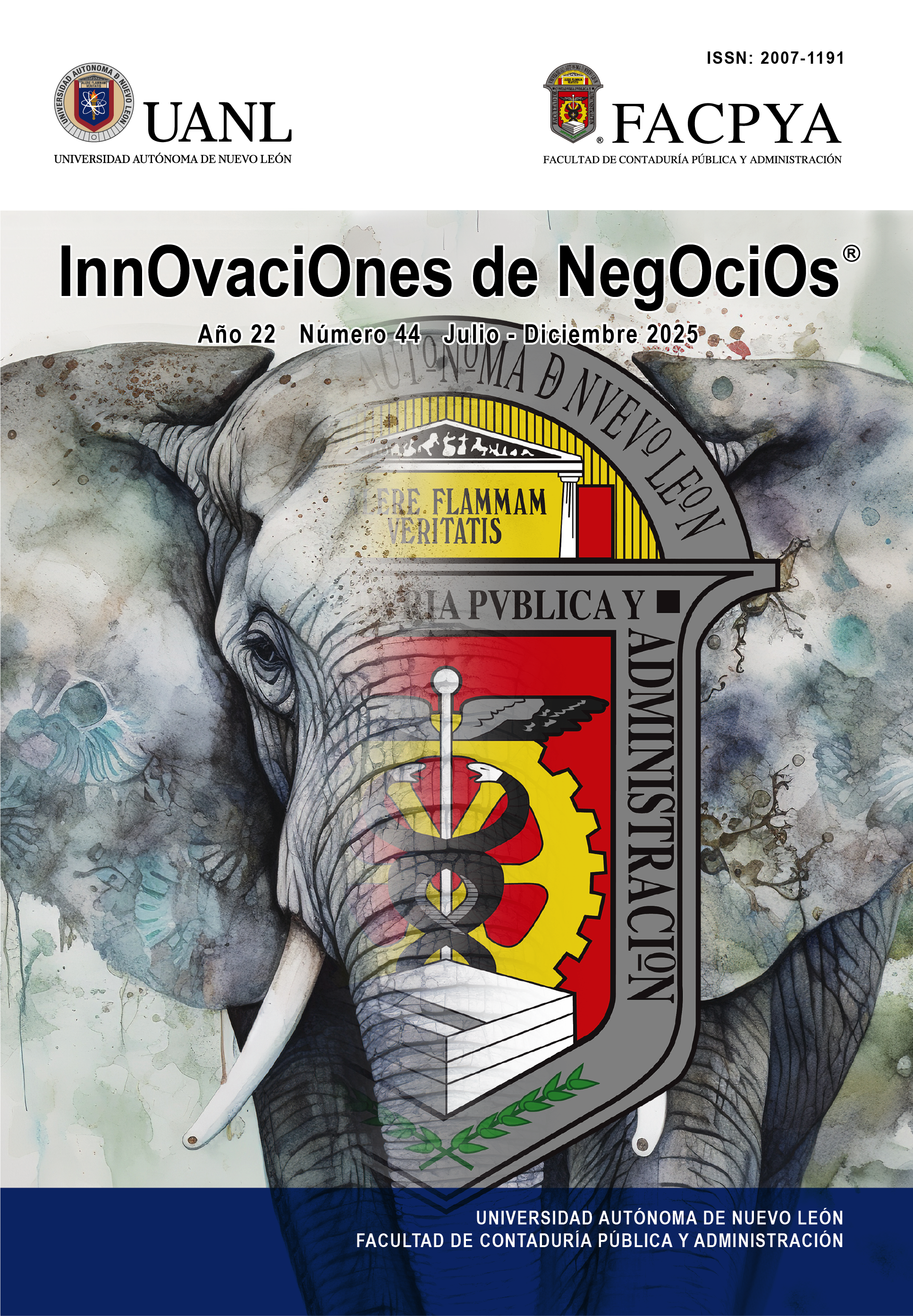Strategic Planning Enhanced by Information Technologies and Web Tracking
DOI:
https://doi.org/10.29105/in22.44-478Keywords:
Web tracking, Big data, Strategic planning, ITAbstract
The objective is to analyze how digital technologies, such as web tracking and big data, enhance strategic business planning by improving decision-making and competitiveness. The research methodology was a qualitative and exploratory approach based on a documentary review of scientific literature and case studies, complemented by semantic analysis using tools like MAXQDA. The results integrate web tracking and big data to improve operational efficiency, trend prediction, and customer segmentation. However, it raises ethical and regulatory challenges related to privacy. Limitations were found in implementation, as it requires balancing technological advancements with regulatory compliance, highlighting regulations such as GDPR and CCPA. The study’s value lies in emphasizing the synergy between digital technologies and strategic planning, offering a framework to adapt to dynamic business environments. The findings enable more flexible and dynamic planning, but success depends on ethical and transparent data management.
Downloads
References
Abrego Almazán, D., Sánchez Tovar, Y., & Medina Quintero, J. M. (2017). Influence of information systems on organizational results. Contaduría y Administración, 62(3), 303–320. https://doi.org/10.1016/j.cya.2016.07.005
Adamczyk, D. (2024). The chair of Honeywell on bringing an industrial business into the digital age. Harvard Business Review. (Agregar URL si está disponible)
Applegate, L., & Vitale, M. (1996). ToyWorld, Inc.: Information technology planning (Harvard Business School Case Study No. 9-196-075). Harvard Business School.
AWS. (n.d.). AWS solutions and services documentation. Amazon Web Services. https://aws.amazon.com/documentation/
Barthelmes, L., Kübler, J., & Bönisch, L. (2024). An open-source interactive travel diary for web-based trip reporting. Transportation Research Procedia, 76, 373–384. https://doi.org/10.1016/j.trpro.2023.12.062
Bazzoun, M. (2019). The digital economy. International Journal of Social Science and Economics Invention, 5(9), 116–123. https://doi.org/10.23958/ijssei/vol05-i09/157
Castell-Uroz, I. (2024). A novel approach to web tracking detection and removal with minimal functionality loss (Tesis doctoral, Universitat Oberta de Catalunya). Tesis en Red. https://tesisenred.net/handle/10803/690818
Cascón Katchadourian, J. D. (2020). Tecnologías para luchar contra la pandemia Covid-19: geolocalización, rastreo, big data, SIG, inteligencia artificial y privacidad. Profesional de la Información, 29(4). https://doi.org/10.3145/epi.2020.jul.29
Collis, D. (2016). Lean strategy: Startups need agility and direction. Harvard Business Review. https://owlnightstudy.com/wp-content/uploads/woocommerce_uploads/2022/02/Lean-Strategy-4katef.pdf
Cusumano, M. A., & Yoffie, D. B. (1999). Judo Strategy: Competing on internet time. Harvard Business Review. https://hbr.org/1999/01/judo-strategy-the-competitive-dynamics-of-internet-time
Ehikioya, S. A., & Lu, S. (2020). A traffic tracking analysis model for e-commerce. International Journal of Networked and Distributed Computing, 8(3), 171–193. https://doi.org/10.2991/ijndc.k.200515.006
Fong, S. (2012). Framework of competitor analysis by monitoring information on the web. Journal of Emerging Technologies in Web Intelligence, 4(1), 77–83. http://dx.doi.org/10.4304/jetwi.4.1.77-83
Kaplan, R. S., & Norton, D. P. (2007). Using the balanced scorecard as a strategic management system. Harvard Business Review. https://hbr.org/2007/07/using-the-balanced-scorecard-as-a-strategic-management-system
Liu, C.-H., & Liu, H.-S. (2009). Increasing competitiveness of a firm and supply chain with Web 2.0 initiatives. International Journal of Electronic Business Management, 7(4), 248–255.
Mankins, M., & Gottfredson, M. (2022). Strategy-making in turbulent times. Harvard Business Review, September–October, 1–9. https://hbr.org/2022/09/strategy-making-in-turbulent-times
Mankins, M. C., & Steele, R. (2006). Stop making plans; start making decisions. Harvard Business Review, January, 1–10. https://hbr.org/2006/01/stop-making-plans-start-making-decisions
Merchant, N. (2012). Why Porter’s model no longer works. Harvard Business Review. https://hbr.org/2012/02/why-porters-model-no-longer-wo
Mesa González, M., & David Tenorio, G. (2018). Estudio conceptual de Big Data utilizando Spring (Tesis de máster, Universidad Politécnica de Madrid). Archivo Digital UPM. https://oa.upm.es/53175/
Mintzberg, H. (1994). The fall and rise of strategic planning. Harvard Business Review. https://hbr.org/1994/01/the-fall-and-rise-of-strategic-planning
Pan, L., & Ruiz-Martínez, A. (2024). Evolution of web tracking protection in Chrome. Journal of Information Security and Applications. https://doi.org/10.1016/j.jisa.2023.103643
Porter, M. E. (1996). What is strategy? Harvard Business Review, November–December, 61–78. https://hbsp.harvard.edu/download?url=%2Fcontent%2Fsample%2F96608-PDF-ENG%2Fcontent&metadata=e30%3D
PREDIK Data-Driven. (2023). Big Data: Aliado clave de la planeación estratégica. https://predikdata.com/es/big-data-aliado-clave-de-la-planeacion-estrategica/
Puthiyamadam, T. (2017). How the meaning of digital transformation has evolved. Harvard Business Review. https://hbr.org/2017/05/how-the-meaning-of-digital-transformation-has-evolved
Ramírez, R., Churchhouse, S., Palermo, A., & Hoffmann, J. (2017). Using scenario planning to reshape strategy. MIT Sloan Management Review. https://sloanreview.mit.edu/article/using-scenario-planning-to-reshape-strategy/
Rathi, N., Riddell, L., & Worsley, A. (2016). What influences urban Indian secondary school students' food consumption? Appetite, 105, 790–797. https://doi.org/10.1016/j.appet.2016.07.018
Sosa, A. (2021). La regulación de la publicidad programática online: Un análisis desde el prisma del derecho comparado. Consumer Law eJournal. https://doi.org/10.18601/01236458.n56.07
Strycharz, J., Smit, E., Helberger, N., & van Noort, G. (2021). Empowering impact of technical and legal knowledge on rejecting tracking cookies. Computers in Human Behavior. https://doi.org/10.1016/j.chb.2021.106750
Tapscott, D., & Agnew, D. (1999). Governance in the digital economy. Finance & Development. https://www.imf.org/external/pubs/ft/fandd/1999/12/pdf/tapscott.pdf
Vergara Silva, J. C. (2004). La economía digital y el management. Revista Escuela de Administración de Negocios, 50, 55–63. https://journal.universidadean.edu.co/index.php/Revista/article/view/278/268
Weber, K., Story, M., & Harnack, L. (2006). Internet food marketing strategies aimed at children and adolescents. Journal of the American Dietetic Association, 106(9), 1463–1466. https://doi.org/10.1016/j.jada.2006.06.014
Zorrilla Salgador, J. P. (2006). The information as strategy in a competitive and global context (SSRN Working Paper No. 1803189). SSRN. https://ssrn.com/abstract=1803189
Downloads
Published
How to Cite
Issue
Section
License
Copyright (c) 2025 Juan Alfredo Lino Gamiño, Sergio Felipe López Jiménez, Isabel Olivares Alcaraz, Víctor Hugo Valdez Barreto

This work is licensed under a Creative Commons Attribution-NonCommercial-ShareAlike 4.0 International License.
The InnOvaciOnes de NegOciOs magazine is a free and open access electronic magazine of a scientific-academic nature and is a publication of the Autonomous University of Nuevo León, in which the authors retain their copyright and grant the magazine the exclusive right to first publication of the work. Third parties are allowed to use the published content, as long as the authorship of the work is acknowledged and the first publication in this journal is cited.
For more information, please contact the Research Secretary (FACPyA) of the Autonomous University of Nuevo León. Telephone: (81) 1340-4430. Email: revinnova@uanl.mx










